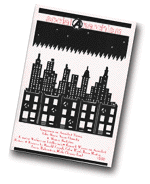Voices for Tiananmen Square: Beijing Spring and the Democracy Movement
February 08, 2006
Voices from Tiananmen Square: Beijing Spring and the Democracy Movement
edited by Mok Chiu Yu and J. Frank Harrison. 201 pp. Montreal: Black Rose Books, 1990. $19.95 paper
edited by Mok Chiu Yu and J. Frank Harrison. 201 pp. Montreal: Black Rose Books, 1990. $19.95 paper
Here's a book you may have overlooked. It was one of the first books on the 1989 demonstrations and massacre at Tiananmen Square in Beijing. It is to be recommended because it conveys an immediate sense of the passion and dedication of that struggle.
But why should we, as anarchists, be interested in a fight for democracy? One answer might be that even a flawed democracy—when compared to Communist authoritarianism —offers more personal freedom and more opportunities to organize for a better world. Mok puts it this way in his introduction "As anarchists, we can hope and struggle for the generation of multiple areas of autonomous self-management and self-government. Therefore, as ever, it is the responsibility of libertarians to remain active in support of a noncapitalist, egalitarian alternative to the historically-defunct Chinese 'socialist' state."
Mok and Harrison in this book present vivid documents and interviews directly related to the hectic events that occurred at Tiananmen Square. For example, there is a piece by Chai Ling, a woman who was a member of the student's Standing Committee and who had actually been designated as Commander-in-Chief. The editors comment, "This essay was written during the May hunger strike, and its conclusion was almost illegible because of the physical exhaustion of the author."
Other documents present theoretical analyses that were written as events happened. Contemporary pamphlets and wall posters are reprinted—not only from students but also from workers, party members, soldiers, and intellectuals.
The first independent labor union since 1949, the Beijing Autonomous Workers' Federation, was formed in Tiananmen Square and maintained its headquarters there until the massacre. The editors present interesting documents on the formation of this labor union and its proposed program.
Finally, there are the documents of the massacre, written almost immediately after it happened by those who survived.
Mok's introduction is a summary of the history (since 1919) of the Democracy Movement and its relationship to the Chinese Communist Party. As he writes, "Maoist libertarianism was never more than rhetoric." The documents in the book show that the Tiananmen demonstrations were protests against authoritarian Communism, but it is not clear to what extent the protesters' idea of democracy corresponded to what we in the West think democracy is. There have been great debates as to whether the concept of democracy in China is limited to political rights, such as freedom of speech and the right to vote. I think there is clear evidence that the Chinese people desire other human rights in addition to political rights. Here is a bit of such evidence: two national legal publications were founded in the 1980s, the daily Chinese Legal Gazette and Democracy and the Law. These publications often handled stories about illegal arrests and imprisonment, use of the third degree, torture in prisons, abuse of authority by cadres, searches without warrants, etc. The total circulation in 1985 of the national law journals was 3.5 million; of the provincial law journals, 24 million (James D. Seymour, "Cadre Accountability to the Law," Chinese Law and Government, Fall 1988, p. 9). This surprising popularity of what would appear to be specialized journals is an indication that ordinary Chinese citizens are interested in human rights and oppose curtailment of them by abusive and arbitrary government.
Mok was the editor of Minus 7, Minus 6, etc., an anarchist magazine that appeared in Hong Kong in the 1970s. He is also an actor and a musician with the Blackbird group there. He was on the streets on May 28, 1989, when (as the editors write) "about 1,500,000 people participated in a pro-Movement demonstration in Hong Kong, including members of trade unions and newspapers that usually supported the PRC." He came to the U.S. and Canada a few months later in order to mobilize support for the Chinese Democracy Movement. J. Frank Harrison is a Canadian professor who edited the often almost unreadable manuscript into a clear and cohesive book.
The main drawback of the volume is that it has no index—and it needs one. It seems that left-wing presses, like Black Rose Books, which published this volume, can put out professional-looking volumes like this but apparently show their independence from the system by never producing indexes. I guess they presume that motivated revolutionaries shouldn't have to bother with names and facts.
But why should we, as anarchists, be interested in a fight for democracy? One answer might be that even a flawed democracy—when compared to Communist authoritarianism —offers more personal freedom and more opportunities to organize for a better world. Mok puts it this way in his introduction "As anarchists, we can hope and struggle for the generation of multiple areas of autonomous self-management and self-government. Therefore, as ever, it is the responsibility of libertarians to remain active in support of a noncapitalist, egalitarian alternative to the historically-defunct Chinese 'socialist' state."
Mok and Harrison in this book present vivid documents and interviews directly related to the hectic events that occurred at Tiananmen Square. For example, there is a piece by Chai Ling, a woman who was a member of the student's Standing Committee and who had actually been designated as Commander-in-Chief. The editors comment, "This essay was written during the May hunger strike, and its conclusion was almost illegible because of the physical exhaustion of the author."
Other documents present theoretical analyses that were written as events happened. Contemporary pamphlets and wall posters are reprinted—not only from students but also from workers, party members, soldiers, and intellectuals.
The first independent labor union since 1949, the Beijing Autonomous Workers' Federation, was formed in Tiananmen Square and maintained its headquarters there until the massacre. The editors present interesting documents on the formation of this labor union and its proposed program.
Finally, there are the documents of the massacre, written almost immediately after it happened by those who survived.
Mok's introduction is a summary of the history (since 1919) of the Democracy Movement and its relationship to the Chinese Communist Party. As he writes, "Maoist libertarianism was never more than rhetoric." The documents in the book show that the Tiananmen demonstrations were protests against authoritarian Communism, but it is not clear to what extent the protesters' idea of democracy corresponded to what we in the West think democracy is. There have been great debates as to whether the concept of democracy in China is limited to political rights, such as freedom of speech and the right to vote. I think there is clear evidence that the Chinese people desire other human rights in addition to political rights. Here is a bit of such evidence: two national legal publications were founded in the 1980s, the daily Chinese Legal Gazette and Democracy and the Law. These publications often handled stories about illegal arrests and imprisonment, use of the third degree, torture in prisons, abuse of authority by cadres, searches without warrants, etc. The total circulation in 1985 of the national law journals was 3.5 million; of the provincial law journals, 24 million (James D. Seymour, "Cadre Accountability to the Law," Chinese Law and Government, Fall 1988, p. 9). This surprising popularity of what would appear to be specialized journals is an indication that ordinary Chinese citizens are interested in human rights and oppose curtailment of them by abusive and arbitrary government.
Mok was the editor of Minus 7, Minus 6, etc., an anarchist magazine that appeared in Hong Kong in the 1970s. He is also an actor and a musician with the Blackbird group there. He was on the streets on May 28, 1989, when (as the editors write) "about 1,500,000 people participated in a pro-Movement demonstration in Hong Kong, including members of trade unions and newspapers that usually supported the PRC." He came to the U.S. and Canada a few months later in order to mobilize support for the Chinese Democracy Movement. J. Frank Harrison is a Canadian professor who edited the often almost unreadable manuscript into a clear and cohesive book.
The main drawback of the volume is that it has no index—and it needs one. It seems that left-wing presses, like Black Rose Books, which published this volume, can put out professional-looking volumes like this but apparently show their independence from the system by never producing indexes. I guess they presume that motivated revolutionaries shouldn't have to bother with names and facts.

